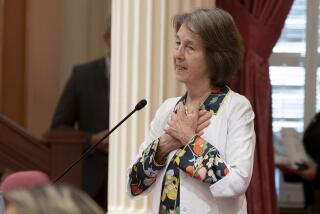Government Says No More Mr. Nice Guy : New trend would require more personal accountability
- Share via
The once commonplace and virtually undisputed idea that individuals are answerable for what they do, and that parents are responsible for the behavior of their minor children, is being newly codified as public policy in a significant number of states. As Times political writer Ronald Brownstein recently reported, this new “personal responsibility agenda” could well emerge as a significant issue in next year’s national political campaigns.
Some state and local governments are using what can fairly be described as coercive measures to encourage positive changes in personal behavior. In a dozen states, students who drop out of high school for reasons other than financial hardship face revocation of their driver’s licenses. In Arkansas, a new law allows for the lifting of licenses of students who fail to maintain at least a C average. In Wisconsin, under a program known as Learnfare, teen-age mothers on welfare must return to school to study toward a diploma or face the loss of 45% of their monthly payment. The presumption is that completion of a high school education increases a graduate’s opportunities in the work force. In California, authorities can now hold parents responsible if their children engage in gang activities.
NEW AGENDA: The agenda goes on. Under federal pressure, states are tightening laws aimed at collecting child-support payments from absent fathers. A law enacted in Arkansas this year marks a controversial change in the legal presumption in paternity cases. Now the burden will be on the man identified on a birth certificate as father to disprove paternity if he wants to avoid the responsibility for support payments.
Some of these ideas may well have more political appeal than practical effectiveness. Using financial rewards or punishments to keep welfare-dependent young people in high school doesn’t assure they will develop the skills needed to hold non-menial jobs. Each year, as employers sadly testify, thousands of young people bearing high school diplomas are found to be lacking in basic skills, requiring expensive remedial on-the-job training. And doesn’t a cut in welfare payments to a teen-age high school dropout threaten to punish the child more than the young mother? Moreover, the personal responsibility agenda doesn’t necessarily save money. Wisconsin’s Learnfare has meant added costs for child care for the children of young mothers who have gone back to school--and for additional counseling and transportation.
POLITICAL APPEAL: Whatever their initial programmatic shortcomings, these and similar efforts to require greater personal responsibility seem likely to increase in political appeal. To some extent, economics is the driving force. A steadily rising percentage of tax dollars is being spent to deal with the consequences of personal immoderation, laxity and misbehavior. As a result, other areas of legitimate government activity are being underfunded, affecting the overall quality of life.
Most Americans accept--in fact insist upon--an implicit social contract under which society, through the mechanism of government, undertakes to help those who because of age or infirmity or temporary misfortune need continuing or short-term aid. Most Americans similarly believe--and may increasingly be prepared to insist upon--the need for much stricter accountability in personal behavior. Behind the fresh emphasis being given that old belief may well be an intuitive sense that the growing breakdowns in personal responsibility we have been seeing threaten the very survival of a free society.
Solid reasons for these concerns to be discussed now in the political arena, not with buzzwords and cheap slogans and demagogic appeals to passion, but soberly, compassionately, and with respect for the social stakes involved.
More to Read
Sign up for Essential California
The most important California stories and recommendations in your inbox every morning.
You may occasionally receive promotional content from the Los Angeles Times.













